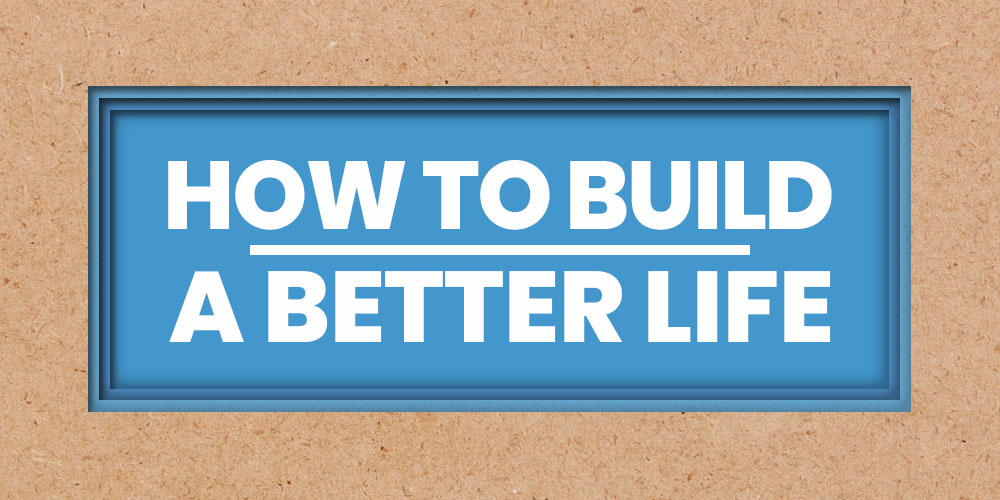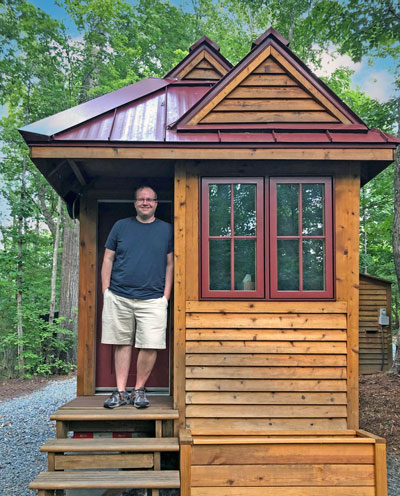 Right now, there are a lot of people quitting their job as part of what has been dubbed “The Great Resignation” following all that happened last year. People had time to reflect on their lives while staying at home, remote work has become a reality for many, and many have just said, “enough is enough.”
Right now, there are a lot of people quitting their job as part of what has been dubbed “The Great Resignation” following all that happened last year. People had time to reflect on their lives while staying at home, remote work has become a reality for many, and many have just said, “enough is enough.”
If you haven’t quit yet but are planning to, we’re going to first cover how to exit properly. And if you have quit, we’re also going to cover how to go about building a better life.
 Hi, I’m Ryan
Hi, I’m Ryan
I’m often asked how I went about building my own path in life. Having simplified things from the ground up; I now live in a tiny house, earn a living doing what I love, and focusing on what matters. In the process I’ve learned a few things and I wanted to share some advice with you!

How To Quit Your Job / How To Resign

If you’ve decided to quit your job but haven’t formally resigned, here is how. First off, while it’s tempting to leave with a dramatic exit, let’s do our future selves a solid and not burn any bridges. You may still want to use this employer as a reference, so let’s exit on the best terms possible.
Preparing To Quit Your Job

First, I’d sit down and get serious about a budget, making sure you have a solid runway, reducing expenses where you can, and having a good handle on where you are financially. This will vary person to person and also depend on if you’re going to go looking for a new position right away or wait a while.
Next, where your employment contracts allow, document all the work you’ve done to build a portfolio for future interviews. I’d also slowly and quietly start taking home most of my stuff, removing my personal property so that when I do give notice, I could walk out right then if I needed to. Some employers have a policy that they end things right there and then and don’t even let you clear out your desk yourself. So why chance it? just have it all cleared out so you can shake hands and move on.
Lastly, I’d think about those who you’d like to stay in touch with and get their personal contact info if you can — subtlety — and don’t already. I’d also connect on LinkedIn.
Formally Resign From Your Job

Write a brief and to-the-point resignation letter. Don’t go into details and be sure to give proper notice based on what the company normally expects for a notice period. During this time, it may be a bit awkward, but if you’re able to stay professional, you maximize your chances of receiving a good reference, should you need it. Again, this is for our benefit, not theirs.
Where possible, give this letter printed and in person to your manager. They will most likely ask why you’re leaving, but I’d just leave it vague and brief. If you have another job lined up, share that you’ll be starting a new position. If you don’t have anything quite yet, I’d say something like, “I’ve decided that it’s time for me to move on.” You don’t owe them an explanation.
Finally, if your company has a formal exit interview, I’d just politely decline. There really isn’t any upside to consenting for you. I’d also decline any counter offers they make, because if they actually valued you, they would have paid you that amount in the first place.
Take A Break For Two Weeks – Weeks 1 & 2

I think this is an important step because we want to create space where we sort through all our thoughts and feelings about our lives and what’s gone on so far up to this point. Life moves fast and we need to slow down enough to sit and reflect on things we haven’t given space to.
I consistently find that people are so busy, they don’t have enough time alone with their thoughts. The endless distractions of work, life, phones, and more mean we put off working on ourselves. Take this time to be alone with your thoughts, catch up on rest, veg out a bit, and do some self-care.
Remember This Isn’t Really A Vacation

I think it’s also important to put a time frame on this because it’s not just kicking back without a plan. I say take two weeks because most often it takes a few days to just wind down. Then a few more days to actually relax.
I also think two weeks is an ideal amount of time because most people barely take any paid time off so they’ve never had the chance to detach for a while. I think a week would just feel like a vacation, while two weeks makes the relaxation restorative.
This time is about getting you in the space mentally to do the work that needs to happen.
Take Time To Work On Yourself

This step requires you to be totally alone with yourself and most importantly that means no phone, TV, computer, social media, or anything else. Normally, we don’t get time to unplug like this because we’re always going nonstop. Now that we’ve taken some time away from work, you have this time and that’s so important.
Additionally, you don’t have the dread of going back to work that is filled with everything that piled up while you were gone.
People are often very uncomfortable with being alone with just their thoughts. You’ll need to fight through this resistance and get comfortable with it.
How To Spend Time With Your Thoughts

For me, I take long walks in nature, and generally the more that’s going on in my life, the longer I need. Your process will be different, but it needs to be distraction-free.
I will sometimes bring a blank notepad and pen so that if there is something I want to Google or remember to check on later, I can write it down and my brain can let it go.
For me, nature is an important part of the process, but I also know some people don’t love the outdoors. You do you — the important part is to be alone with your thoughts.
My walks typically follow this mental pattern:
- Think through all the things that are going on in my life.
- Resolve most things down to the one or two things that I need to address.
- Think through and deal with the emotions of those things bothering me the most.
- Go round and round with them in my thoughts until they’re actually resolved.
- Realize I’m lying to myself and wrestle with my thoughts some more.
- My brain goes blank and I realize I’m being present in that moment.
It is only then that I realize I’m able to totally set aside the things that have been bothering me and be in the moment, which is where the real growth is going to happen. Sometimes steps one through six take only 30 minutes, sometimes it takes hours. For me, that sometimes means a very long hike, because only when you get to that final stage can the work begin.
For these hikes, I usually choose a pretty easy route so I can cover more distance without worrying too much about fatigue, and I bring lots of snacks and water. You can also find a good place to sit and chill out — you don’t need to be moving to be thinking. I’ve gone to a park and sat at a picnic table before. Other times I do this at a coffee shop, but I also allow myself to leave if I find I’m getting distracted.
What are you trying to figure out during this time?
It’s going to be different for everyone, below is a worksheet you can use to help.
Catch Up On Things You Never Had Time To Do – Week 3

Catching up is a good way to help you build up some positive momentum without jumping back into the same life you used to live — we don’t want to fall back into old patterns. It also helps you further clear mental space because we all have a running list of unfinished to dos in the back of our minds. Whether we’re aware of it or not, it’s hanging out there, subtlety pulling for our attention and adding to our sense of stress.
In the next few steps, we’re going to start to design our ideal life and we don’t want these unfinished to dos detracting from that deep work that needs to be done.
Start by making a list of all the things you’ve put off. This could be things like getting an oil change, fixing something around the house, changing a light bulb, going through your fridge and pantry, etc.
Get it on your list and then work your way through that list it like it’s your job. Because right now, it kind of is your job; You’re taking this time for you, so take it seriously. The first two weeks were about relaxing, so now that you’re rested up, don’t laze about.
I’d also recommend taking the time to clean your house from top to bottom, declutter heavily, and organize things thoroughly. It’s rare that you’ll have free time to do this, so take advantage of it. This can take time, but it also further allows you to be totally focused on what comes next and not on the junk drawer, messy counter top, or overflowing closet that is a constant hassle.
If you need to take more time than a week to do this, then do so, but do it intentionally and work on it all day, every day until it’s done. Go all in here.
Refocus On Productive Activities That Spur Positive Feedback Loops – Week 4

We all have things we’ve let slide over the years when life seemed to get in the way. Let’s take this time to refocus on some positive things we can do.
Taking a break like you’re doing now lets you get over the initial hump of setting a new habit in a positive feedback loop, allowing you to keep them going long term. Start these new positive habits around week four and continue with them as a new norm for you.
Start Cooking Most Meals At Home

Start cooking at home for most of your meals. Try avoiding processed foods and cook from whole foods as best you can. If you can’t cook at all, make a sandwich, even if you do it badly. People get wrapped up in not being able to do this perfectly, but don’t let yourself. Don’t let perfection get in the way of good.
Consider subscribing to a meal-in-a-box service like Green Chef or Blue Apron for a few weeks. Watch YouTube cooking channels to learn how to cook some simple things. Don’t get fancy and don’t get overwhelmed — cooking is just a great way to save money, slow down, and share a meal with loved ones.
If you cook your own foods from simple ingredients, it will pretty much guarantee you’re going to eat better. You’re putting higher quality inputs into your body and therefore getting a higher quality of output. This stacks the deck in your favor and, since you’re living the YOLO life, you’ve got the time.
Again, this doesn’t have to be complex, there are some really excellent recipes that are dead simple for a person who has never cooked a day in their life. Something I really like is sheet pan meals, where you throw all the ingredients on one sheet pan and toss it in the oven. Below are a few to get you started.
I’d also consider cutting out alcohol entirely for at least 30 days. Seriously.
Connect With Friends And Family

During these first few weeks or, at the latest, week four, take the time to reconnect with loved ones. Ideally one on one and in person where ever possible. Do your best to leave behind the phones, as they’re just going to get in the way. Choose people who activate you, who care for you, and who leave you feeling energized. If that list seems small or non-existent, take this time to think about how you can remedy that situation.
Evaluate And Set Boundaries

It’s easy get lost in our lives: We throw ourselves into our work, we commit to our partner in a relationship — we are so busy taking care of others that we don’t make room for ourselves, which means we are trying to pour from an empty vase.
If we don’t take care of ourselves first, we can’t show up for the important people in our lives when they need us. Putting aside the guilt, you should extend the same kindness you extend to others to yourself as well.
If you’re someone who continually puts your own needs on the back burner for the benefit of others, you should spend some time establishing boundaries. These will help you make space that you need and also encourage others to help themselves when we you can’t be there all the time.
Do Something For You

Find a hobby, a mini adventure, or a curiosity to nurture for a while and set aside a few hours a week to do only that. If you get into something that turns out to not be as interesting as you thought, just make the conscious decision to do something else. If not this, then what?
For me it’s hiking, reading, and various creative outlets. Whatever you decide to do, make it a priority and establish it during this time where you can reflect how it impacts your mood, your energy, and your interaction with family and friends.
Practice Good Sleep Hygiene

Sleep is critical and boat loads of studies show that good sleep is a massive factor in good health.
Quick Tips For Good Sleep:
- Don’t eat within 3 hours before bed
- No phones, tablets, TV, or screens 60 mins before bed
- Get in bed 30 minutes before you want to fall asleep with no phone
- Sleep at least 7 hours
- When you wake up, try to get outside in the morning light without sunglasses or shade for 45 minutes
- Be consistent about your sleep routine and the points above
Start To Build A Vision For Your Life – Week 5 and Beyond

Building a vision for our lives seems like a daunting task — in fact, there have been many times when I struggled to do this myself. What’s become clear to me is that there is no perfect solution, magic bullet, or secret that’s going to unlock a vision for my life or instantly help me “find my passion.” If some “guru” says they have a system, they’re lying.
So, let’s dispense with that right up front. There is no trick, no hack, no secret. But there is a way …
Some of you probably have a clear vision of what your ideal life would be. If that sounds like you, check yourself to make sure you haven’t just adopted someone else’s vision as your own.
For the rest of us, I believe there are a few main ingredients to this that should be customized for your purposes:
- Don’t stand still, move in any direction
- It’s not bliss, it’s about what you’re willing to give up
- Treat this like an experiment
- Be open and question everything
Don’t Stand Still, Move In Any Direction

Here’s what I’ve found to be true for me: When I don’t know what I want to do, what my goals are, or what I should do next, I’ve learned that the worst thing to do is to stand still. Just start doing something — literally anything.
More likely than not, you’re not going to know what your purpose is until, one day, you stop what you’re doing and realize that you’re already doing it. What that means is we need to do several things in an intentional manner until we find what’s is right for us.
But realize that it’s not going “click” or come to you in some grand vision when you discover some secret or insight. It will slowly sneak up on you, consuming your whole life in a weird and unexpected way.
Choose A Starting Direction

Consider things that you’ve found interesting, curious, fun, or maybe even something that scares you. If that doesn’t work, start putting yourself in different environments that you’re not quite comfortable in, talk to people you’d never normally speak to, attend events that aren’t what you’d consider your thing, read a book that’s outside your normal pattern, or go to your favorite places at a totally different time.
Go into those things curious and open.
In many cases, I think it’s not so much that you’ll “find” something while doing these things, but by doing these things you’re not comfortable with, you are forcing yourself to be more open. You are literally strongarming your mindset into a place that is more receptive to new thoughts. This allows you to see opportunities that are sitting right in front of you.
What To Do When You Can’t Find Direction, Purpose, Or Passion

I’ve been here before and know how tough it is. I was making a real, concerted effort at progress, but despite a thoughtful approach and a lot of work, I came up with nothing. I was desperate and knew that if I couldn’t figure it out, I was cruising to a state of real depression.
Here’s what I did at that point: improve myself.
 I had no idea what I wanted, but I made the decision that until I figured it out, I would work on being the best that I could be. At least then when I figured out whatever my life’s purpose was, I’d be in a good place to seize it!
I had no idea what I wanted, but I made the decision that until I figured it out, I would work on being the best that I could be. At least then when I figured out whatever my life’s purpose was, I’d be in a good place to seize it!
The reason this works is because by making a decision, subconsciously you’re saying to yourself, “I’m betting on myself. I am worth it.” In that seemingly simple decision, you’re also setting aside the excuses, which is so key to your mental game here.
This is also just a really positive way to trick yourself into motion. Remember earlier when I said pick a direction and start moving? This has the added benefit of improving your body and mind to boot.
So set about the task of working on your mind and your body. Eat better, exercise, be serious about getting better sleep, go to a therapist even if you think you don’t need one, put down the devices, and take a break from social media, the news, and alcohol.
Ask Yourself: What Do I Want More/Less Of?

A good practice I’ve found is when you can’t paint a picture of what you want your life to be, then at least make a fuzzy image of it.
Remember those picture books where there were numbered dots on a page and you’d draw lines between them and suddenly a picture became clear? That’s what we want to do. We want to put lots of independent data points down on the proverbial page so we can start to connect them and draw a picture. The more dots, the clearer the picture. How do we do that?
Ask yourself these questions
What do I want more of in my life?
What do I want less of in my life?
I’ve found people may not always know what they want in life, but they can list 100 things they don’t want in their life with ease. The important part here is not to be vague — be really specific about these things.
Here’s the trick …
Take what you don’t want in your life and then ask, what’s the oppositive of that?
Do you hate having a micro manager who doesn’t trust you to deliver without them butting in? Flip it! I want a manager who empowers me to deliver my work independently. Frustrated with how disorganized and chaotic your home always is? You want to strive for a well-organized and tidy lifestyle.
It’s Not Bliss, It’s About What You’re Willing To Give Up

Now that I’m on the other side of this having found what my passion is, most people expect fulfillment to be a blissful state with no problems and only happy times. That’s absolutely incorrect. What it’s really about is finding something that you enjoy doing so much that all the stuff that normally drags you down, the boring stuff and the difficult challenges, literally doesn’t matter because you see it as the price you pay to do what you love to do.
There is a lot of talk about finding your passion on the internet. The online conversation typically sounds like “living your best life,” “doing what you love,” and so on. Honestly, most of these people are faking it, but for those who have found it, it’s hard to talk about it without sounding very positive because it’s a blissful state.
The truth is that when I think about a goal, a passion, or an ideal life, it comes down to being honest about what I have to give up in service to that. This isn’t a negative mindset or a scarcity thing and often doesn’t have to be about money at all.
It’s about what hard work I have to do and the uncomfortable truths about myself I need to square with. It’s having perseverance when life throws me down a flight of stairs to get back up.
And the uncomfortable truth is after life does that, you’re going have to climb back to the top of those same stairs and throw yourself down them again, over and over. Why? Because you’ve decided that the life you love comes at a cost and it’s a price you’re happy to pay every day.
Do Hard Things

Humans are really lazy creatures; we seek comfort and our lives are pretty good. This is actually rooted deep in our DNA because it allowed our ancestors to be very efficient when they were fighting for survival every day.
Basically, our ancestors had to be lazy to preserve energy or they would have run out of calories and starved to death. So, in a weird way, we are the evolutionary survivors of the laziest people ever. Cosmic joke right there.
 Things started to go wrong once we progressed into modern life. It’s hard to keep the perspective that life as we now know it is only a hundred or so years old!
Things started to go wrong once we progressed into modern life. It’s hard to keep the perspective that life as we now know it is only a hundred or so years old!
Most of us don’t have to worry about starving, we are pretty healthy compared to our ancestors, and we have amazing climate-controlled boxes we call houses instead of a patch of ground around a fire we stoke to stay warm and ward off predators that want to eat us. Where our ancestors would have keeled over from the flu, we take a $3 pill that cures it.
We have it really good. If you ever doubt that, take a trip to a less fortunate country and stare into the faces of those who live in absolute poverty. If you’re reading this on a laptop, you’ve been afforded a life of such luxury and opportunity that it is unapparelled through human history.
This is where the true “first-world problem” exists. When you’re not fighting for survival every day, you suddenly need to create something to struggle for and through. The only way to do that is to consciously do difficult things that challenge you to grow.
I’ve found a good way to kick start this is with the 75 Hard Challenge, which I outline here:
Treat This Like An Experiment

I can’t guarantee much through this process, but the one thing I can is that you’re going to get a lot wrong. As you start to move in some directions, you’re going to get it wrong. The trick here is to not beat yourself up for it.
You’re going to pick a direction and then constantly course correct along the way. As you course correct, you’re going to be able to make decisions faster and at a higher level of accuracy because you’re gaining experience from doing it wrong. Doing it wrong is kind of the whole point.
My best advice is not to say you’re going to do ___ and worry about failure, but instead to say, “I’m exploring this right now.” Think of it as a series of mini experiments.
 If you have a gut feeling or curiosity about something, make a mini hypothesis about it, then test it out. After you complete the “experiment,” stop, reassess, and design the next experiment.
If you have a gut feeling or curiosity about something, make a mini hypothesis about it, then test it out. After you complete the “experiment,” stop, reassess, and design the next experiment.
The key thing here is to remember that it’s not a failure, it’s just a result of the experiment. You just ran the test and observed results, no big deal.
People also have a tendency to bail at the first sign of trouble or difficulty. Remember, you need to be willing to give up things like your ego, your negative self-talk, and your preconceived notions in service of this new life you want to build.
If you don’t want to go back to your old life, remember what drove you insane to the point that you quit your job. When you fall flat on your face, when it gets really hard, you’re going to have to say “F#@$ it, I’m not going back.”
Push through and push hard. The old you would have given up, but you’re not that person any more.
Be Open And Question Everything

While you’re exploring things and running your experiments, you also want to build in some natural stopping points where you take a step back and question everything. If you adopt my experimentation method, you’ll have a hypothesis that you test, then you can stop after running that experiment and reflect on it and ask yourself some questions.
- Should you continue?
- How would you continue differently?
- What did this experience teach you about what the next step might be?
- If this wasn’t it, why wasn’t it, and what’s the opposite of that thing?
Build The Life You Want

If you come into this with a plan, be smart about it, and question each step along the way, you’ll eventually find a home in the perfect life for you. Set aside the negative self-talk. Forget the social pressures of society and focus on you. Realize that you’re going to have failures and that’s part of the process.
Also realize that there isn’t a magic bullet, a process that works for everyone, or a secret to success.
The General Path I’d Suggest Trying Is This:
- Relax and create space.
- Take time to do housekeeping in your home, in your life, and in your mind.
- Start to outline what you want your life to look like.
- Determine a direction to experiment and start moving.
- When in doubt, improve yourself — mind and body.
- Do difficult things and push through failures and self-doubt.
- Take time to stop and evaluate, and question everything.
- Rinse and repeat.
The way forward is frankly through doing the difficult work, failing forward, and not bailing when things get tough.
The good stuff is on the other side of those things that you think are so hard they might break you.
Your Turn!
- What advice do you have to share for others?
- What tips have you found to find the right path?













I really enjoyed reading what you wrote.
Life at times can be extremely difficult and it may take time to figure it all out. Life is a rollercoaster of ups and downs and we learn along the way. I’ve found it’s best not to ignore problems but to always keep a positive mindset and focus on what’s important. I think to myself that while some people may have any easier life than me some have it much worse.
I came up with this motto:
“A bad day in America is a good day in another country”.
.